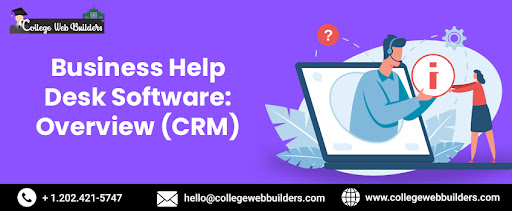
Business Help Desk Software: Overview (CRM)
The business help desk is powerful software, especially for the small businesses that are dealing with customers and don't have enough budget to hire a full-fledged team of professionals who can keep employee and customer satisfaction on top. Thus, many small businesses started outsourcing the best CRM Software Development services in Ashburn VA in their respective countries as well as in other countries. Almost 90% of the businesses claim that yes, the business help desk software has helped them in improving their business efficiency, and also improve their business relationship with their customers and employees.
What Does Business Help Desk Software Do for Business?
A business help desk software can do numerous things for your business depending on your CRM Software Development company in Ashburn VA to create it. But here are some of the basic things which help desk software will do that can help in boosting the business.
- Contacting: It depends on how your customers contact you, for example with emails, phones, texts, dm, etc. Some readymade help desk software comes with all while others can be customized according to the business need.
- Ticket Management: It is a vital system that makes the customers complain about the tickets and keeps them organized in a manner. Not limited to this but it also tracks and records their progress from compliant to resolution.
- Self Service: The best business help desk software is the one that has the feature of self-service for the business customers. Self-services like queries and frequently asked questions help to save the time of the business and even the customer.
- Centralized Database: With the help of business help desk software, the company can access a centralized database which will be effective in better decision making for the business and its customers. With the centralized system, everyone can analyze and thus make effective decisions for them.
- Automation: The help desk software allows your executive to automate and manage their pipelines and processes of the business. Also, not only this, the CRM Software Development helps in making accurate forecasting of the future by analyzing the earlier sales performance.
- Lesser Wastage: Have you ever heard of the 80/20 principle, like 20% things bring 80% of the results? Well, a good custom business help desk software helps businesses to find those 20% things which are bringing 80% sales to the business or find those 20% things which are bringing 80% of the customer satisfaction and repetitive sales. Hence helps in lesser wastage of time, efforts, resources, and other a lot of things. It's a way of smart work, not hard work.
Key Factors to Determine While Getting a Business Help Desk Software
There are some of the key factors or features one needs to consider when you are getting a custom CRM software development by a CRM Software Development agency in Ashburn VA.
- Capacity Of Database: If you have business with many customers or have the vision to be the one in the future then this step needs to be focused on. Get the business help desk software that can handle a huge database effectively.
- Customization: Getting help desk software that is customizable according to the customers' needs is the best one.
- Knowledge Access: How much your business help desk software allows your customers to access the knowledge. Knowledge like FAQs, and queries.
Getting Your Own Business Help Desk Software
Getting a custom business help desk software can greatly enhance your customer support operations and improve overall business efficiency. Here are the key steps to follow to get your custom software solution:
1) Identify Your Requirements: Start by defining your specific business needs and requirements for the help desk software. Consider factors such as ticket management, customer communication channels, reporting and analytics, integrations with other systems, and any unique features or workflows specific to your business.
2) Find a Reliable Software Development Partner: Look for a reputable software development company with expertise in building custom help desk software. Research their portfolio, client reviews, and expertise in developing similar solutions. Choose a partner that understands your business requirements and can provide a tailored solution.
3) Collaborate on Solution Design: Work closely with the software development team to design the architecture, features, and user interface of your help desk software. Clearly communicate your goals, workflows, and desired outcomes. The development team should provide guidance and suggestions based on their expertise.
4) Development and Testing: Once the design is finalized, the software development team will start building your custom help desk software. Regular updates and progress reports should be provided to keep you informed throughout the development process. Thorough testing should be conducted to ensure the software functions as intended and meets your requirements.
5) Deployment and Training: After development and testing, the software will be deployed to your business environment. The development team should assist with the setup and configuration, ensuring a smooth transition. They should also provide training to your team on how to use the software effectively.
Integrating BHD With Your Office
Integrating your Business Help Desk (BHD) software with your office systems can streamline your operations and improve productivity. Here are some key steps to consider for a successful integration:
1) Identify Integration Needs: Determine which office systems or applications you want to integrate with your BHD software. This may include customer relationship management (CRM) systems, email clients, project management tools, or other internal systems used for communication and collaboration.
2) Assess Compatibility: Check the compatibility of your BHD software with the office systems you want to integrate. Ensure that the necessary APIs or integration options are available and supported by both the BHD software and the office systems.
3) Define Integration Goals: Clearly outline your integration goals and objectives. Identify the specific data or functionalities you want to sync or share between the BHD software and office systems. This could include syncing customer information, ticket status updates, or automating the creation of tasks or notifications in other tools.
4) Select Integration Methods: Determine the best integration methods for your needs. This could involve using pre-built integrations offered by your BHD software provider or using custom development to create tailored integrations. Explore options like webhooks, APIs, or third-party integration platforms.
5) Execute Integration: Work with your BHD software provider or an experienced development team to implement the integrations. Configure the necessary settings, establish data mappings, and set up any required authentication or authorization mechanisms.
6) Test and Validate: Thoroughly test the integrations to ensure data is syncing correctly and functionalities are working as expected. Validate the integration across different scenarios and workflows to identify and address any potential issues.
7) Train and Educate Users: Provide training and documentation to your team members on how to effectively use the integrated systems. Ensure they understand the benefits and functionalities of the integration and how it improves their daily workflows.
8) Monitor and Maintain: Regularly monitor the integration to ensure it continues to function properly. Stay updated with any updates or changes to the integrated systems and make necessary adjustments or updates as needed.
Conclusion
In the article, we learned about the features and what a good business help desk can do for your business. In conclusion, business help desk software, also known as CRM (Customer Relationship Management) software, is a valuable tool for managing customer interactions and improving overall business operations. It provides a centralized platform to streamline customer support, sales, and marketing processes, leading to enhanced customer satisfaction and increased efficiency. With features such as ticket management, customer data organization, and analytics, CRM software offers businesses a comprehensive solution to effectively handle customer inquiries, track sales leads, and build stronger customer relationships. By implementing a robust help desk software, businesses can optimize their operations, improve customer experiences, and achieve long-term growth and success. If you are planning to outsource a CRM software development company don’t forget to consider the factors above. To know more, visit Collegewebbuilders.com.
- Tags: Marketing, Onlline, Internet





